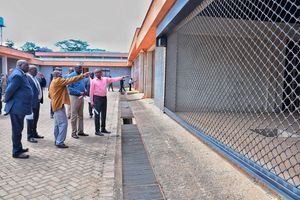
A Kenya National Highways Authority (KeNHA) signboard indicating a contract awarded for the maintenance of the Ruiri-Kienderu-Meru road.
State entities were slapped with an additional Sh4.1 billion in penalties and interest on unpaid bills in the three months to March this year, bringing the total figure to Sh14.72 billion. This highlights the dire impact of their inability to make timely payments of the debt.
Analysis of official data from the Controller of Budget (CoB) shows that overall penalties jumped from Sh12.07 billion in December last year with Kenya Rural Roads Authority (KeRRA) topping with a rise of Sh2.6 billion to Sh14.72 billion followed by Kenya National Highways Authority (KeNHA) at Sh1.09 billion to Sh8.09 billion.
Inability to settle the debts has triggered penalties and interest further amid funding cuts effected by the National Treasury, which is grappling with stagnated revenues and soaring foreign debt payment burdens.
Accumulation of pending bills has particularly hit the private sector, forcing scores of firms to halt expansion and staff hiring plans, lay off workers and increasingly rely on bank loans to fund operations.
“It (high pending bills) leads to high government costs of doing business due to the accumulation of interest charges and penalties on unpaid invoices, and it erodes trust between the government and the private sector,” says CoB

Controller of Budget Margaret Nyakang’o.
.
Other entities that reported notable increase in penalties or interest on their debt in the three months to March this year include the Water Resources Authority with a fresh penalty of Sh84.68 million.
The National Oil Corporation booked an additional penalty of Sh50.14 million which increased its liabilities to Sh1.01 billion while the Kenya Urban Roads Authority's penalty rose by ShSh30.13 million to Sh478.3 million.
“Accumulation of pending bills restrains cash flows to businesses, resulting in liquidity constraints, especially for small and medium-sized enterprises, as they have to endure the long wait for settlement of overdue payments. This forces such businesses to either scale back operations, lay off workers, or even shut down operations,” added Nyakango.
But the entities in the roads sector are expected to have cut the portfolio of bills from March this year after the state secured a loan of Sh73 billion to pay off contractors. The amount will be repaid via a Sh175 billion bond that will be floated before the end of this year.
State-owned entities, just like their counterparts in the counties, have defaulted on bills for years, hitting contractors and even lenders in what the CoB say has dampened trust of the private sector in the government's ability to pay for services and goods delivered.
Government-owned entities paid contractors and lenders Sh8.7 billion helping cut the total unpaid bills to Sh421.63 billion in March this year from Sh426.25 billion three months earlier.
But accumulation of unpaid bills has been marred with cases of fictitious debts prompting formation of a committee to cross-check them before payment.
The committee, formed in September 2023 had by start of May this year probed Sh518.7 billion worth of unpaid bills, setting the stage for payment of those whose claims have been confirmed as legitimate.






